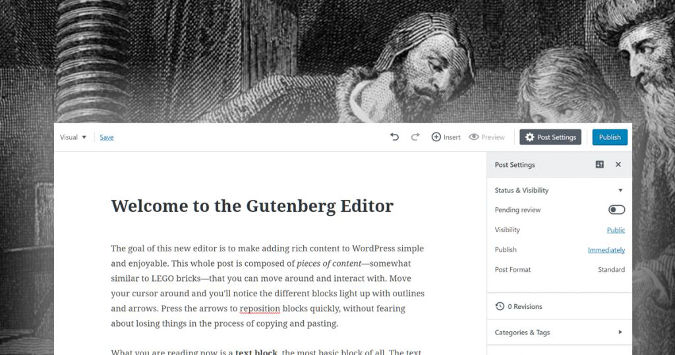Sometimes change happens incrementally and within an existing framework. Other times though, change requires a new way of doing things where old ways become irrelevant and are replaced. WordPress is about to go through such a change. This means, among many other things, that my favorite theme, Canvas, is being retired.
Canvas was developed in 2010 by Woothemes. It allows the look and feel of a site to be customized in hundreds of ways from the theme control panel rather than with code. WordPress bought Woo a few years back, renamed it Woocommerce, and just announced Canvas was being retired. Why? Because WordPress is embarking on a huge new project called Gutenberg which completely alters the core of the WordPress editor and customizer. Canvas was made for a different era and can’t be updated to work with upcoming versions of WordPress that have Gutenberg. Canvas will slowly become obsolete because it can’t take advantage of these new features, which start with a new editor in WordPress 5.0.
Woo did the right thing. They announced why they are retiring Canvas, are providing a free upgrade path to another theme, Storefront. They admit Storefront is for commerce so might not work well with blogs and magazine-style sites. I have multiple sites using Canvas and am looking at TagDiv Newspaper and PootlePress 18tags themes as possible replacements.
We’ve come to a difficult decision: as of today, we’re no longer selling Canvas.
WordPress is constantly evolving, and Canvas is no longer a good option for site builders using newer versions of WordPress – we don’t want to recommend a theme we don’t think will serve you in the future.
The WordPress theming world will experience a new wave of innovation over the next two years. The rise of page builders and the many multipurpose themes means more and more people expect easy-to-use customization tools for WordPress. Current work on the WordPress core Editor and Customizer will evolve how we build and use themes, and the Gutenberg plugin will fundamentally change how themes and content within WordPress are created.
Canvas isn’t built to keep up with the changes
While still early, we believe strongly that Gutenberg is the future. We’ve decided to invest our resources in preparing our products for it in order to bring you the best experience. Unfortunately, that won’t include Canvas.
We will keep Canvas compatible with the latest releases of WooCommerce and WordPress until all existing Canvas support subscriptions have lapsed. Lifetime subscriptions will end on October 24, 2018, and all other subscriptions will end at their currently scheduled date.
WordPress founder Matt Mullenweg on Gutenberg, which starts to roll out in WordPress 5.0. It’s big. Everything is based on blocks, it’s modular, so changes, editing, plugins, themes, blogging, stores, become easier to create and maintain for everyone, not just developers.
When Johannes Gutenberg’s press came out, people mostly used it to print the same religious text monks had been copying. It wasn’t until ten or fifteen years later that people started innovating and trying their hands at new kinds of writing, and the wheels of change started to spin faster. Now it’s WordPress’ turn to do the same. Gutenberg meets our challenges and opportunities head on while simultaneously benefiting everyone who makes a living working in the WP ecosystem. It’s about a lot more than just blocks. Our Gutenberg moves every part of the WordPress ecosystem forward:
Plugin developers will be able to completely integrate into every part of WordPress, including posts, pages, custom post types, and sidebars without having to hack TinyMCE or squeeze their entire feature behind a toolbar button. Today, every plugin that extends WordPress does it in a different way; Gutenberg’s blocks provide a single, easy-to-learn entry point for an incredible variety of extensions. Some folks have already begun to port their plugins over, and are finding that they’re easier to build and have a much improved UI. I’m looking forward to highlighting those stories as we get further along and more people write about them.
It’s big. It moves the WordPress ecosystem forward, but it also moves the whole web forward.
Which is scary! Because change always is, and this is a big one. But a scary thing is usually a thing that leads to growth, if you can push through it.
Gutenberg will be a sea change for WordPress. I’m looking forward to it even if all my sites with Canvas will need new themes.
